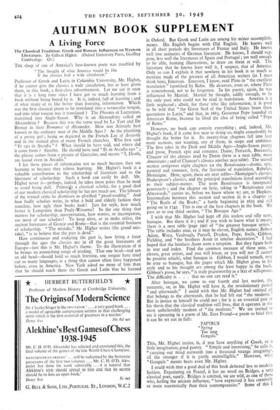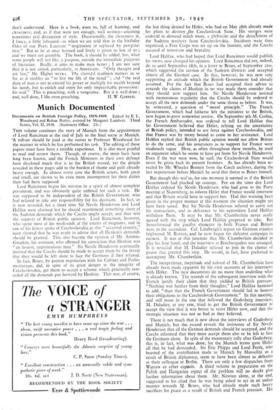AUTUMN BOOK SUPPLEMENT
A Living Force
THE sleep of one of America's best-known poets was troubled by "The thought of what America would be like If the classics had a wide circulation."
Professor of Greek and Latin in Columbia University, Mr. Highet, if he cannot give the classics a wide circulation, has at least given them, in this book, a first-class advertisement. Let me say at once that it is a long time since I have got so much learning from a book without being bored by it. It is, indeed, full of learning ; and of what many of us like better than learning, information. Which was the first classical poem to be translated into a vernacular tongue, and into what tongue was it translated ? The Phoenix of Lactantius, translated into Anglo-Saxon. Why is an Alexandrine called an Alexandrine ? Because this was the verse used by Le Tort and De Bernay in their Romance of Alexander. How was Aristotle best known to the ordinary man of the Middle Ages ? As the plaything of a pretty girl ; being so depicted in the French Lay of Aristotle and in the stained glass of many French churches. Who first said " Et ego in Arcadia " ? What should he have said, and where did it come from ? Goethe. He should have said " Et in Arcadia ego " ; the phrase comes from a picture of Gucrcino, and means " I, Death, am found even in Arcadia."
I list these pieces of information not so much because they are learning as because they relieve learning. Mr. Highet's book is a valuable contribution to the scholarship of literature and to the literature of scholarship. Such a book can easily be dull. Mr. Highet never is—perhaps, indeed, he takes more pains than he need to avoid being dull. Primargy a classical scholar, for a good deal of our modern classical scholarship he has not much use. The labours of the textual critic he dismisses as glorified " proof-reading." And how badly scholars write, in what a bald and elderly fashion they translate, how ugly their books look! Just for style, how much better is Lempriere than Pauly-Wissowa! In the one thing that matters for scholarship, interpretation, how remiss, or incompetent, are most of our scholars! To keep alive, or to make relive, the ancient literatures of Greece and Rome—that is the essential business of scholarship. "The mistake," Mr. Higfiet writes (the grand mis- take), " is to believe that the past is dead."
How continuous and enduring the past is, how living a force through the ages the classics are in all the great literatures of Europe—just this is Mr. Highet's theme. To the illustration of it he brings an astonishing range of reading. That one head—and not an old head—should hold so much learning, one tongue have tried out so many languages, is a thing that cannot often have happened before, even in America. New York asked no more of him than that he should teach there the Greek and Latin that he learned in Oxford. But Greek and Latin are among his minor accomplish- ments. His English begins with Old English. He knows well in all their periods the literatures of France and Italy. He knows well two centuries of German literature. He knows, I should sup- pose, less well the literatures of Spain and Portugal ; yet well enough to be able, hunting illustrations, to draw on them at will. The literature that he knows least well is, I suspect, that of America. Only so can I explain it that nowhere in his book is so much as mention made of the greatest of all American writers (as I must think him), Emerson. Emerson, I know, read Plato in " the excellent translation" furnished by Bohn. He deserves, even so, where Plato is remembered, not to be forgotten. In his poetry, again, he was influenced by Martial. Martial he thought, oddly enough, to be the only poet who could not be read in translation. America is a little neglected ; albeit, for those who like information, it is gocd to be told that " the Great Seal of the United States bears three quotations in Latin," and that, in 1663, Governor Pope founded an American Rome, because he liked the idea of being called " Pope of Rome."
However, no book can contain everything ; and, indeed, Mr. Highet's book, if it came less near to doing so, might conceivably be thought the better for it. Its twenty-four chapters fall into four main sections, not wanting, any of them, in scope and ambition. The first takes in the Dark and Middle Ages—Anglo-Saxon poetry and prose, French epic and romance, Dante, Petrarch, Boccaccio, Chaucer (of the classics read by Dante there is a neat table, more Americano ; and of Chaucer's classics another neat table). The second section comprises eight chapters on the Renaissance—drama, epic, pastoral and romance, lyric, the literature of translation, Rabelais, Montaigne. Here, again, there are neat tables—Montaigne's classics, Shakespeare's classics, and the principal translations listed according to their subject-matter. The term Renaissance is interpreted generously ; and the chapter on lyric, taking in "Renaissance and Afterwards," carries us, before we know where we are, to Hopkins. Intermediate between this section and section iii is a chapter cn "The Battle of the Books," a battle beginning in 1635 and still going on in 1742. This is one of the best chapters in the book. We pass so to our third section, " The Baroque Age."
I wish that Mr. Highet had kept off this useless and silly term, baroque. But there it is ; and if you wish to know what it means, there is a neat table (page zoo) of " the greatest baroque artists." The table includes nine, or it may be eleven, English names; Robert Adam, Wren, Vanbrugh, Purcell, Dryden, Pope, Swift, Gibbon, Fielding, and " the brothers Asam in interior decoration." I had hoped that the brothers Asam were a misprint. But they figure both in text and index. Find the common measure of these nine, or eleven, great artists, and you will know, or you will not (I cannot be positive which), what baroque is. Gibbon, I would remark, may be ever so baroque, but the pages which Mr. Highet gives to his style and to his thought are among the least happy in the bock. Gibbon's prose, he says," is truly praiseworthy as a feat of will-power. The difficulty is . . . that no one can read it."
After baroque, we come to our fourth and last section, the romantic, or, as Mr. Highet will have it, the revolutionary period " and afterwards." I could wish that Mr. Highet had omitted all that belongs to the afterwards, that he had left out " the moderns." But in justice to himself he could not ; for it is an essential part of his thesis that the classical tradition still lives, that it operates in the most unbelievably modern of " the moderns." • We are invited to sec it operating in a poem of Mr. Ezra Pound—a poem so brief that it can be set out in full: PAPYRUS " Spring Too long Gongula."
This, Mr. Highet insists, is, if you have anything of Greek, or a little imagination, good poetry. " Simple and interesting," he calls it, "carrying our mind outwards into a thousand strange imagining., all the stronger if it is partly unintelligible." However, shat " Gongula " means beats even Mr. Highet.
I could wish that a good deal of this book deferred less to modern fashion. Expatiating on Pound, it has no word on Bridges, a very classical poet, surely. Bridges is omitted, we are told, as one of those who, feeling the ancient influence, " have expressed it less creatively or more eccentrically than their contemporaries." Some of this I don't understand. Here is a book, even so, full of learning, and cleverness; and, as if that were not enough, well written—attaining sometimes real distinction of style. Occasionally, the cleverness is, I fancy, a little laboured—as when we are told that in the birthday Odes of our Poets Laureate " inspiration ie replaced by perspira- tion." But to be at once learned and lively is given to few of us ; and we must not grumble. The book, it should be added, has, what some people will not like, a purpose, outside the immediate purposes of literature. Really, it aims to make men better ; I am not sure that it is not aimed, particularly, at Americans. " Only thought and art live," Mr. Highet writ' s. The classi:al tradition matters in so far as it enables us " to live the life of the mind " ; end " the real duly of man is not to extend his power or multiply his wealth beyond his needs, but to enrich and enjoy his only imperishable possession: his soul." This is preaching, with a vengeance. But it is well done ; and, vi ell done, I like even preaching. H. W. GARROD.















































 Previous page
Previous page